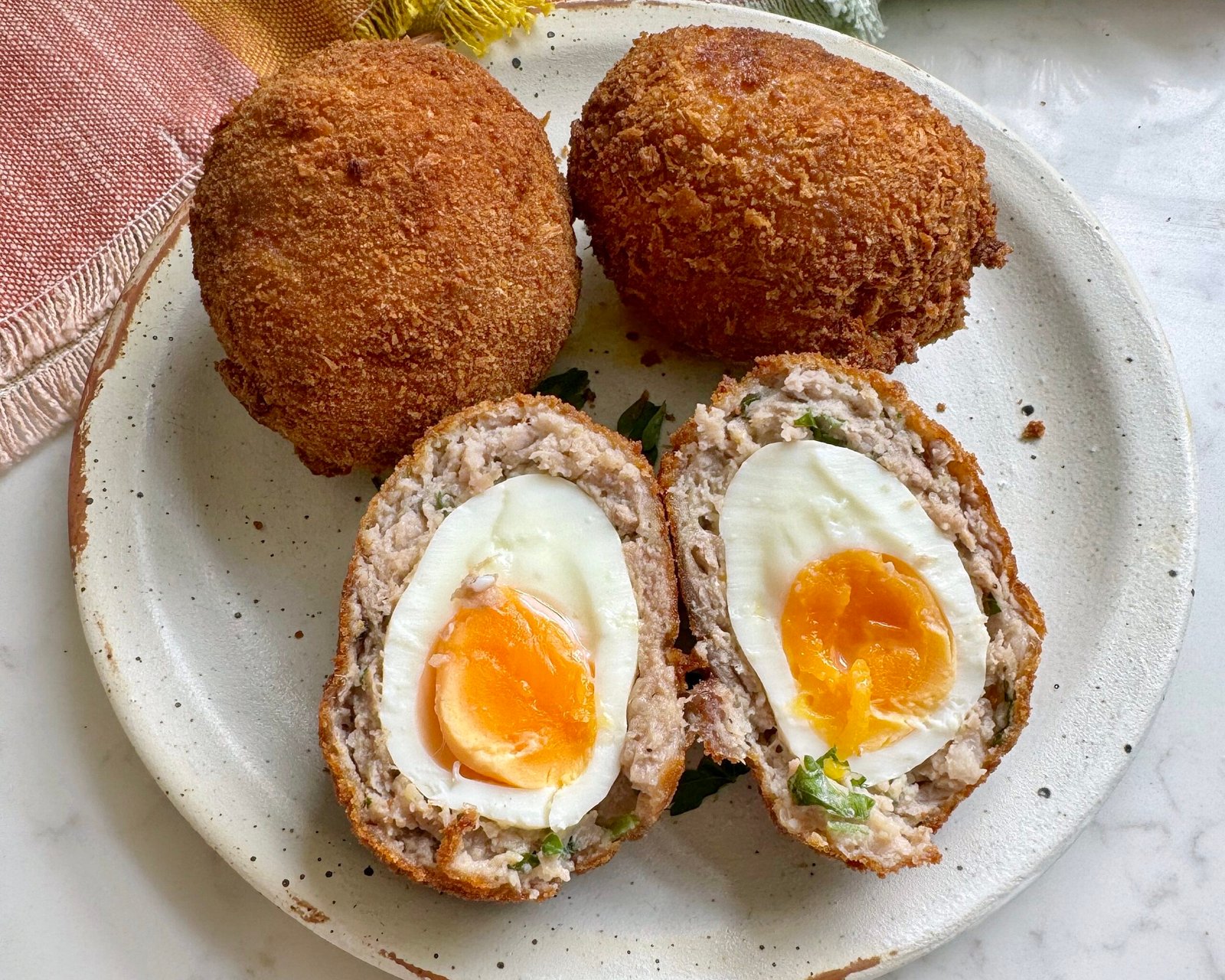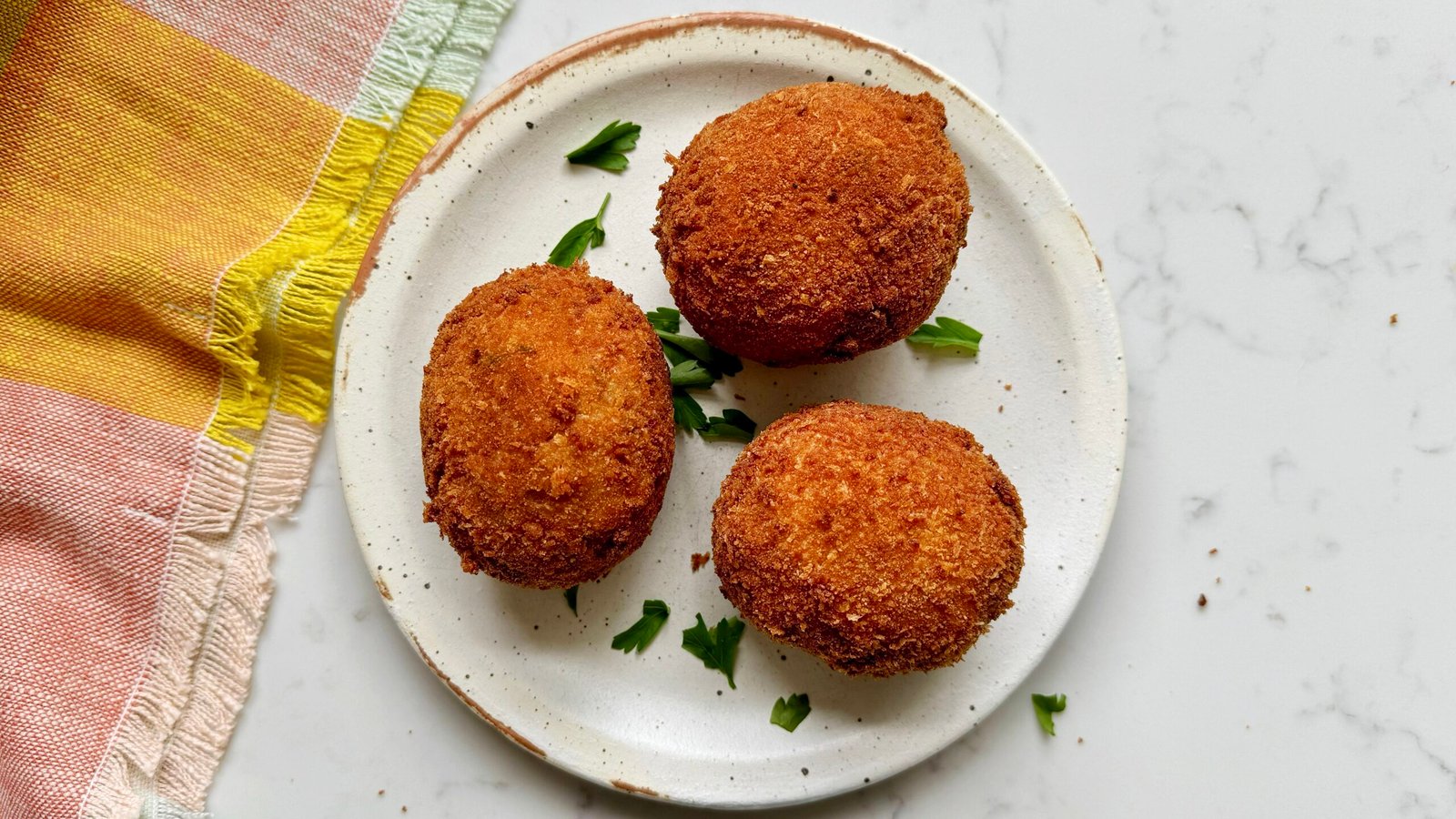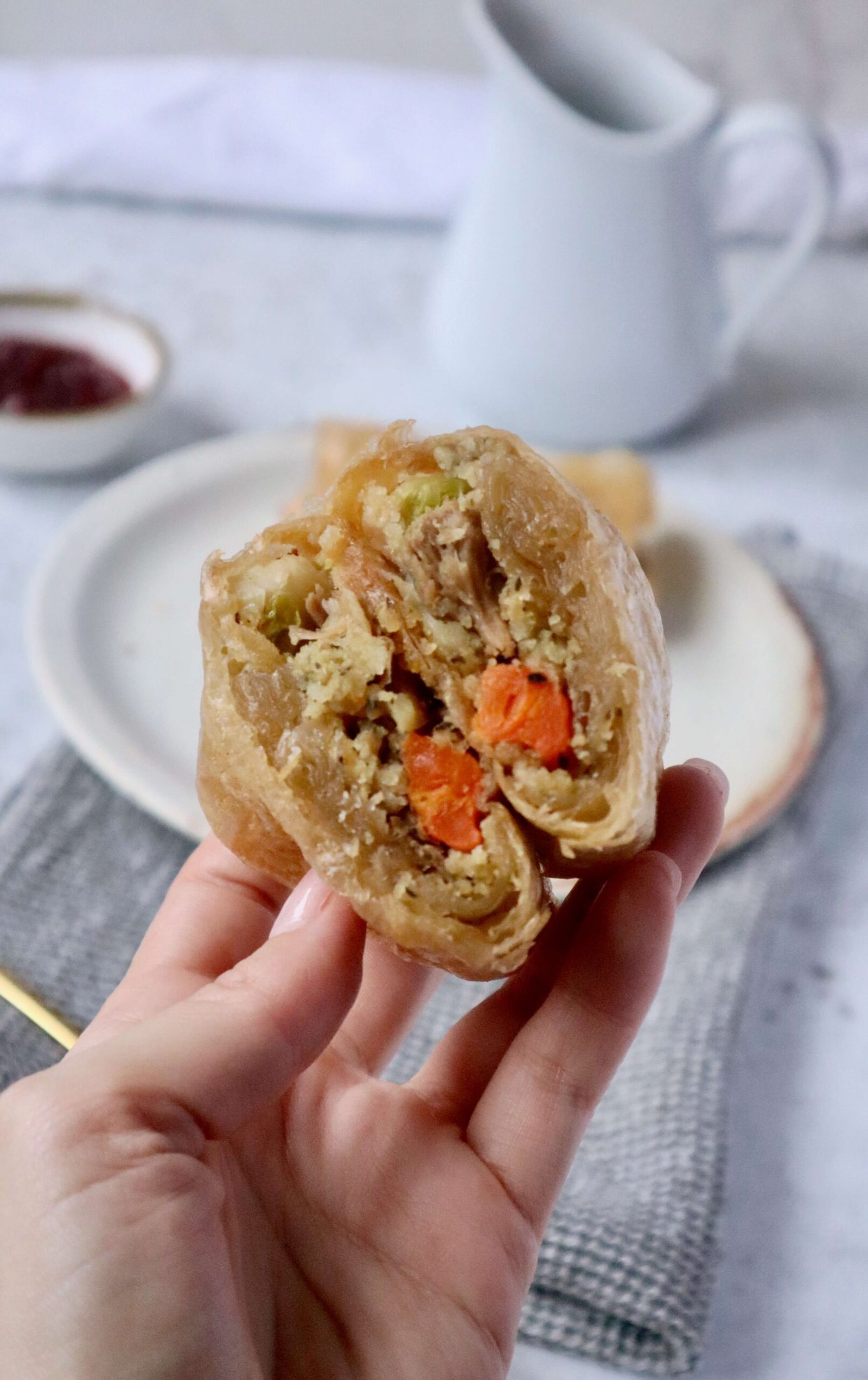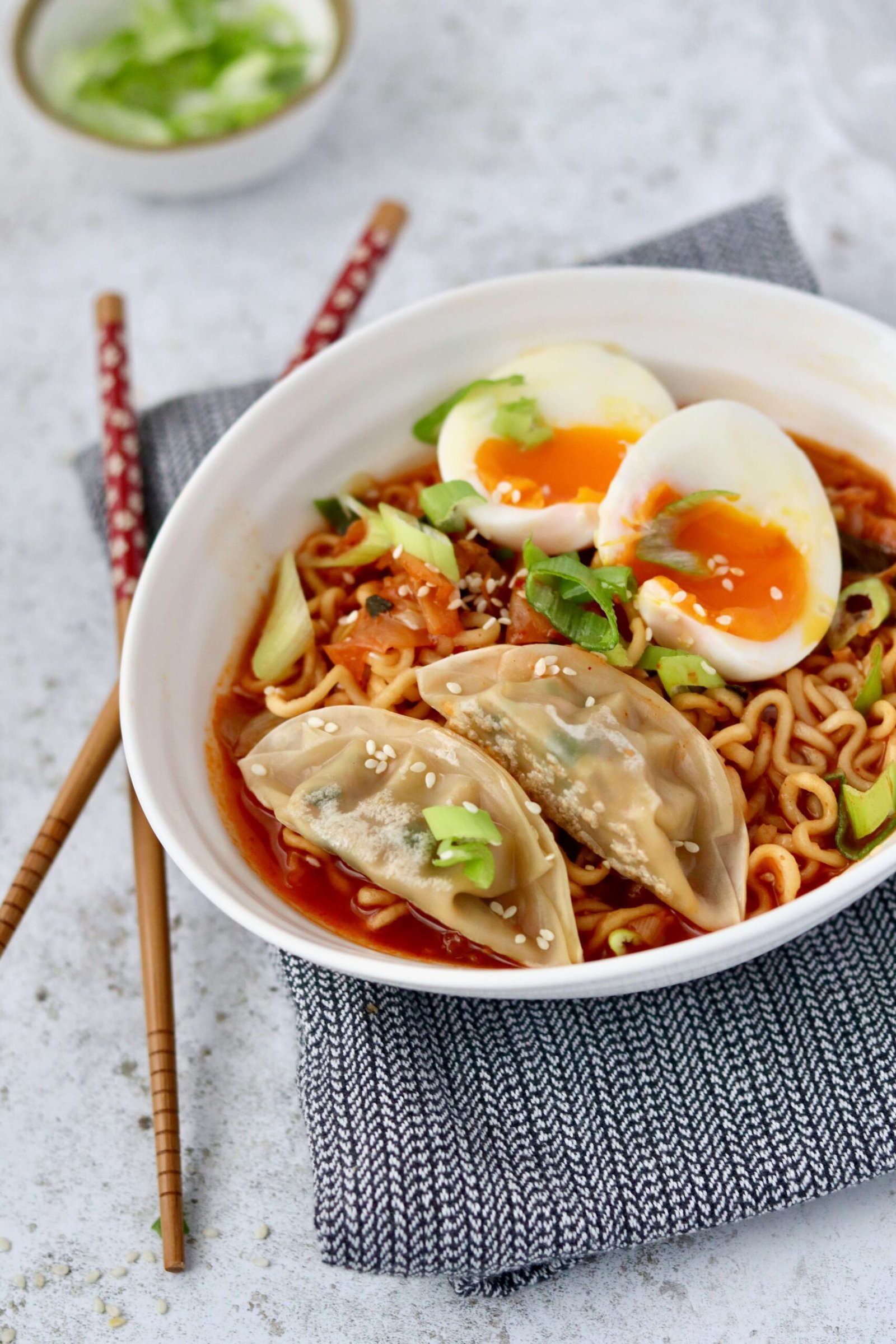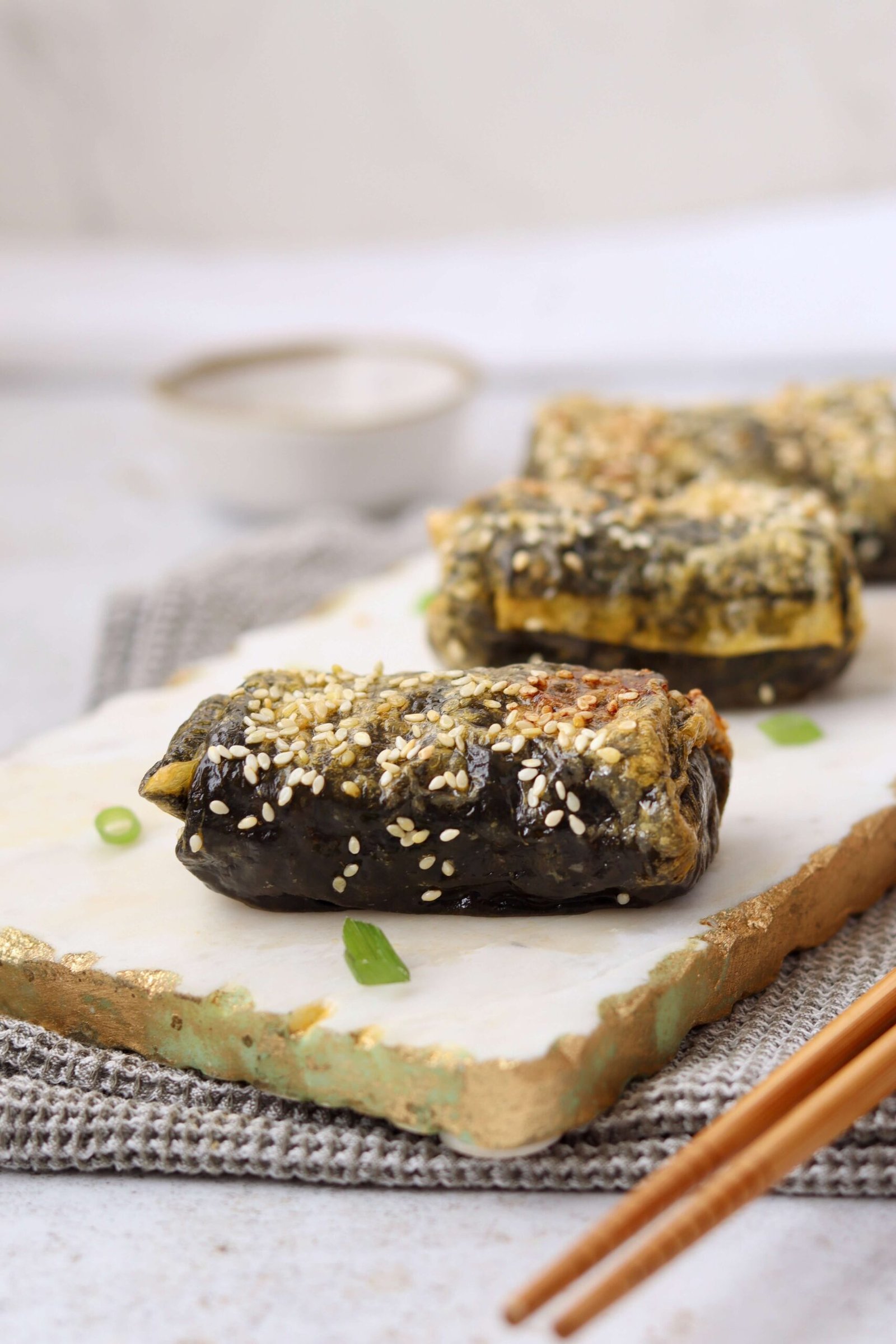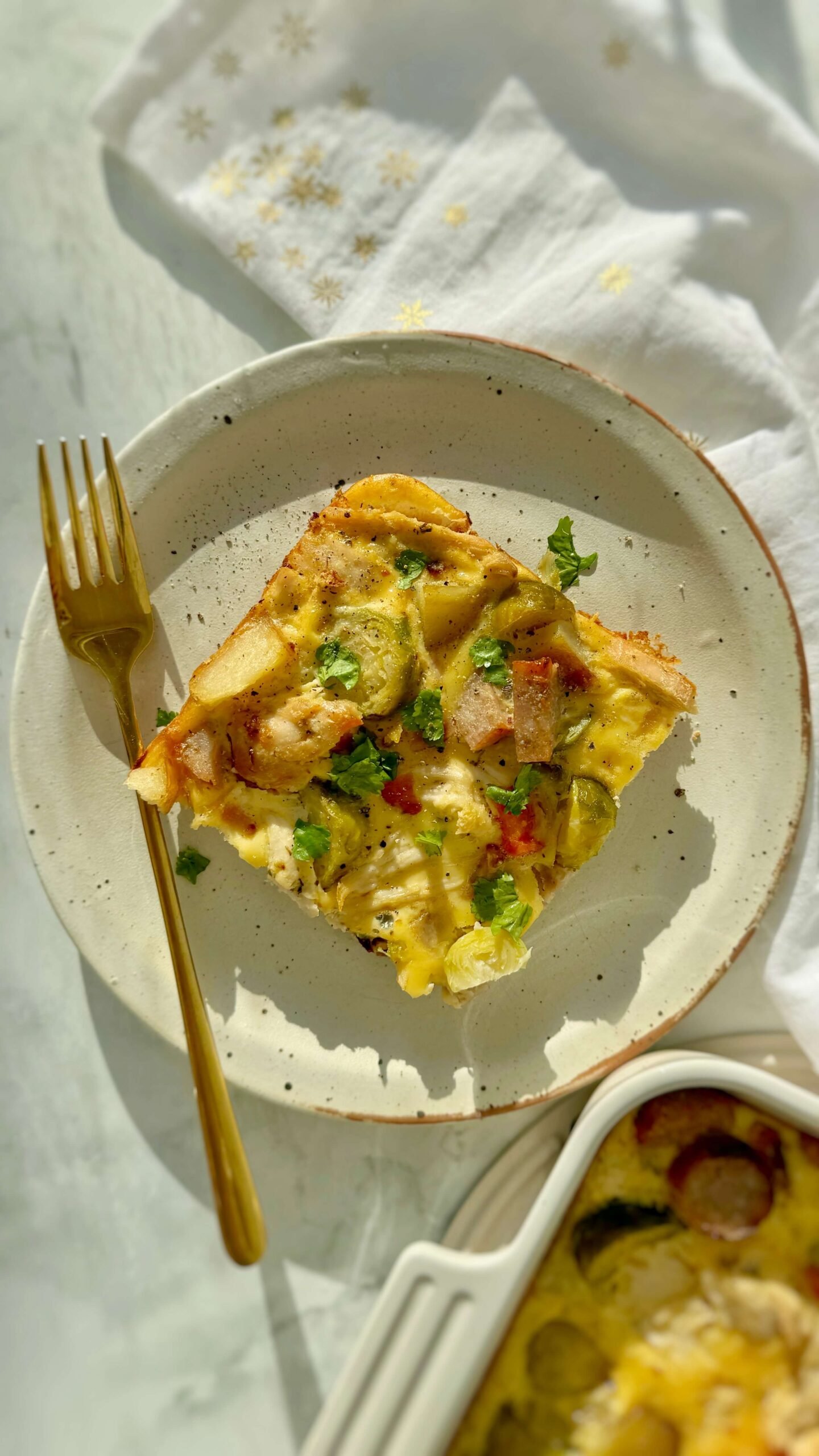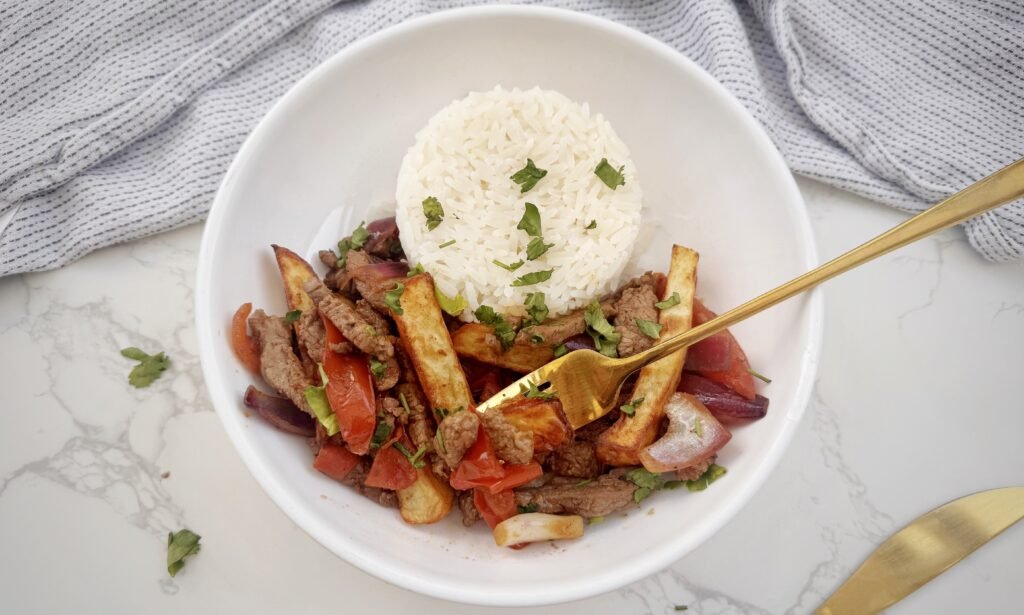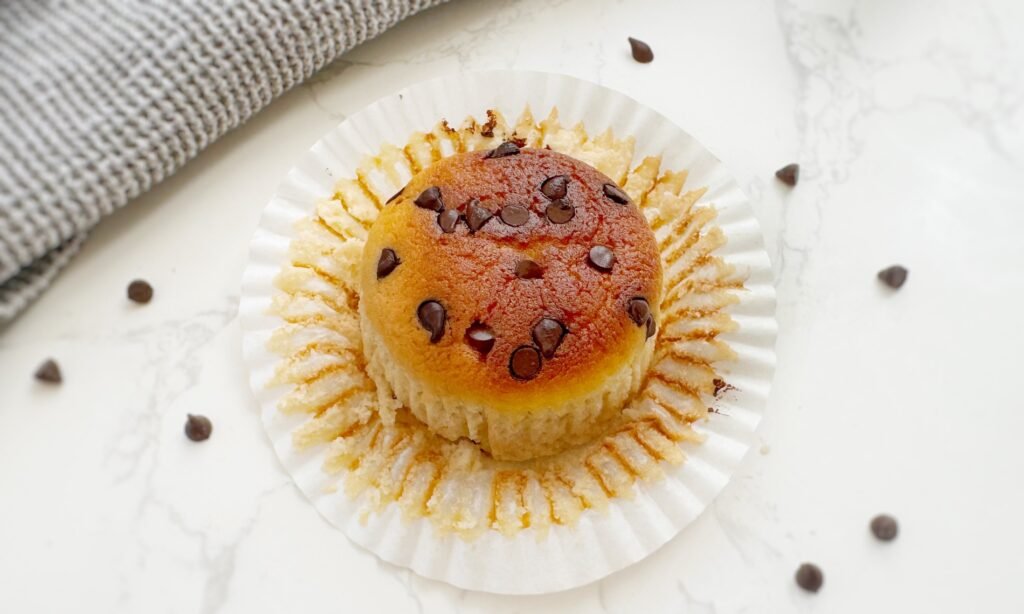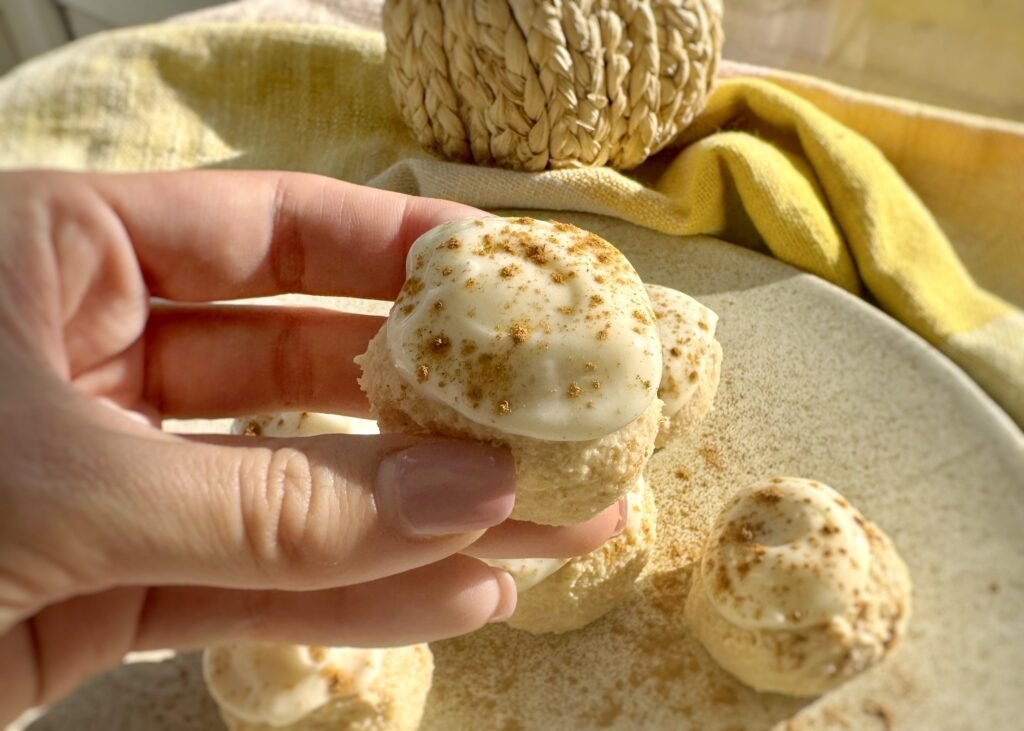Scotch eggs are a beloved British classic, perfect for picnics, parties, packed lunches, or a hearty snack. Traditionally made by encasing a boiled egg in seasoned sausage meat, coating it in breadcrumbs, and deep-frying until golden, they offer a satisfying combination of flavours and textures. With their crisp outer shell, savoury meat layer, and creamy-centred egg, Scotch eggs have earned their place as a staple in British cuisine.
Originating in the 18th century, Scotch eggs have evolved from luxury food items into widely accessible snacks available in supermarkets and pubs across the UK. Their versatility also allows for endless customisation, from different meats and spices to vegetarian versions. Whether you enjoy yours warm, freshly fried, or cold from the fridge, these eggs never fail to impress.
This recipe takes you step-by-step through creating your own homemade Scotch eggs. While frying is the traditional method, you can also bake or air fry them for a lighter alternative. Included are tips for perfecting texture, customising flavours, and suggestions for serving. Once you master the basics, you’ll find yourself coming back to this recipe time and time again. Whether you’re planning a garden party or simply craving comfort food, homemade Scotch eggs bring a touch of indulgence to any occasion.
Why You Will Love This Recipe
- Classic comfort food: Scotch eggs combine crispy coating, juicy sausage, and soft egg in every bite.
- Great for meal prep: These can be made ahead and stored, making them ideal for lunches and snacks.
- Customisable: Adapt the recipe to suit your preferences with herbs, spices, or even vegetarian alternatives.
- Impressive yet simple: Despite their gourmet appearance, Scotch eggs are easy to prepare with minimal ingredients.
- Perfect for gatherings: A real crowd-pleaser that works well for buffets, picnics, and festive spreads.
Ingredients
- 450g / 1 lb sausage meat – savoury base that encases each egg.
- 6 medium eggs – for boiling; soft-centred eggs are ideal.
- 3 medium eggs – for coating and binding breadcrumbs.
- 45g / 1/3 cup plain flour – helps the coating stick.
- 1 tbsp dried herbs (thyme or sage) – adds aroma and flavour to the flour mixture.
- Pinch of salt – essential seasoning for flour.
- Small bunch of fresh parsley, chopped – adds freshness to the sausage meat.
- 1.5 tbsp Dijon mustard – gives a zesty depth to the meat.
- 300g / 3 cups breadcrumbs – panko or golden-style preferred for a crunchy finish.
- 1 litre / 4 cups vegetable oil – suitable for deep frying.
Method
- Boil the eggs: Place 6 eggs into boiling water and cook for 5 minutes. Transfer to ice-cold water immediately to cool. Peel gently once cooled.
- Prepare the coating: Mix flour with herbs and salt in a shallow bowl. Whisk 3 eggs in another bowl. Place breadcrumbs in a third.
- Season the meat: In a large bowl, mix sausage meat, parsley, mustard, salt, and pepper until well combined.
- Wrap the eggs: Divide sausage mixture into 6. Flatten each portion, place a boiled egg in the centre, and wrap the meat evenly around it.
- Coat: Roll each wrapped egg in flour, dip into whisked egg, and coat with breadcrumbs. Repeat egg and breadcrumb steps for extra crunch.
- Fry: Heat oil to 175°C / 350°F. Fry Scotch eggs in batches for 5–6 minutes until golden and crisp. Drain on kitchen paper.
- Serve: Let them rest for a few minutes, then slice and serve with dips or mustard.
Nutrition (Per Scotch Egg)
- Calories: ~430 kcal
- Protein: 22g
- Carbohydrates: 19g
- Fat: 31g
Tips for Making This Recipe
- Use chilled eggs for easier peeling after boiling.
- Don’t overcook the eggs – aim for a soft centre.
- Wet your hands when handling sausage meat to prevent sticking.
- Double coat with breadcrumbs for extra crispiness.
- Test oil temperature with a wooden spoon; bubbles should form when dipped.
- Drain thoroughly on kitchen paper to remove excess oil.
- Use panko breadcrumbs for the crispiest finish.
- Freeze before frying if prepping in advance (then defrost before cooking).
- Experiment with flavours by adding spices like paprika or chilli.
- Bake instead of frying for a lighter version – 200°C for 25 minutes.
How to Best Serve This Recipe
- As a snack or light lunch with salad and mustard.
- In a picnic hamper – Scotch eggs travel well and taste great cold.
- With a dipping sauce such as mustard mayo or sweet chilli.
- On a brunch board with fruit, cheese, and pastries.
- With chips and slaw for a hearty pub-style meal.
- At buffets and parties – sliced in half for sharing.
- With pickles or gherkins for tangy contrast.
- Inside a sandwich for an indulgent protein-packed bite.
- With beer or cider for a perfect pairing.
- Topped with chutney for extra flavour.
Customise This Recipe
- Use flavoured sausage meat such as chorizo or apple.
- Swap for veggie sausage to make it vegetarian.
- Add spices like cumin, smoked paprika, or curry powder.
- Mix in cheese with the sausage layer for melty richness.
- Add a breadcrumb seasoning like garlic powder or parmesan.
- Try duck eggs for a twist and larger portions.
- Add chilli flakes for a spicy kick.
- Serve with different sauces – aioli, salsa, or pesto.
- Make mini versions using quail eggs.
- Try baking instead for less oil and easier clean-up.
How to Store This Recipe
Allow Scotch eggs to cool completely before refrigerating. Store in an airtight container in the fridge for up to 4 days. To reheat, place in an oven at 180°C / 350°F for 10–12 minutes, or enjoy cold. Not recommended for freezing once cooked.
Conclusion
These Scotch eggs offer an irresistible mix of textures and flavours: the tender egg, the herby sausage, and that golden, crispy shell. While often thought of as shop-bought convenience food, homemade versions are leagues above in freshness, flavour, and satisfaction. By following this guide, you can master the perfect Scotch egg, customising it to your own taste and serving it in a variety of ways.
Their versatility makes them suitable for everything from breakfast to a sophisticated starter. With just a few pantry staples and some careful handling, these golden orbs become a standout dish, full of nostalgic British charm. And while they may appear complex, this recipe demystifies the process, making it approachable and fun.
Whether you’re preparing for a casual lunch, a picnic, or a weekend treat, this Scotch eggs recipe delivers every time. Try it once, and you’ll never go back to store-bought versions. Keep it classic or make it your own – either way, you’ll be making them again and again.
You can see this recipe on instagram:
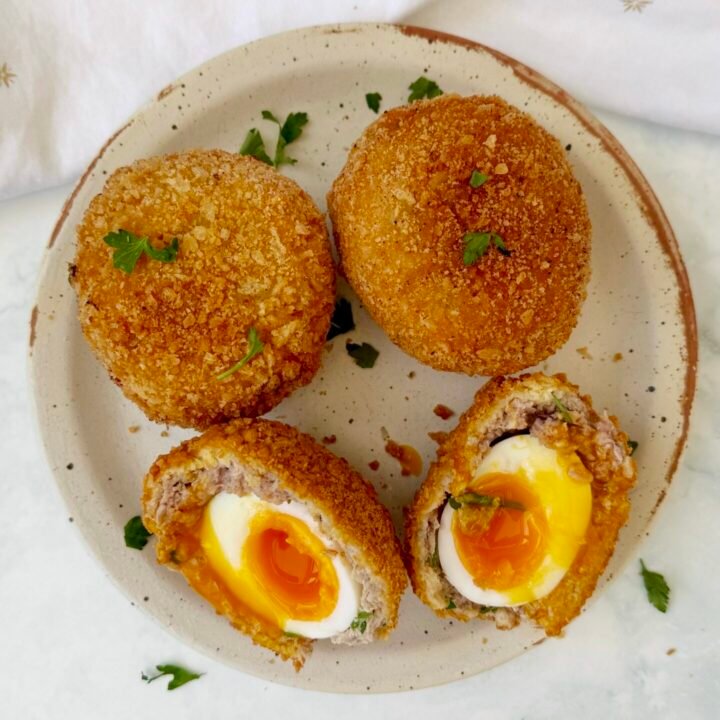
Scotch Eggs
Scotch eggs are a beloved British classic, perfect for picnics, parties, packed lunches, or a hearty snack. Traditionally made by encasing a boiled egg in seasoned sausage meat, coating it in breadcrumbs, and deep-frying until golden, they offer a satisfying combination of flavours and textures.
Ingredients
- 450g / 1 lb sausage meat
- 6 medium eggs – for boiling
- 3 medium eggs
- 45g / 1/3 cup plain flour
- 1 tbsp dried herbs (thyme or sage)
- Pinch of salt
- Small bunch of fresh parsley, chopped
- 1.5 tbsp Dijon mustard
- 300g / 3 cups breadcrumbs
- 1 litre / 4 cups vegetable oil
Instructions
- Boil the eggs: Place 6 eggs into boiling water and cook for 5 minutes. Transfer to ice-cold water immediately to cool. Peel gently once cooled.
- Prepare the coating: Mix flour with herbs and salt in a shallow bowl. Whisk 3 eggs in another bowl. Place breadcrumbs in a third.
- Season the meat: In a large bowl, mix sausage meat, parsley, mustard, salt, and pepper until well combined.
- Wrap the eggs: Divide sausage mixture into 6. Flatten each portion, place a boiled egg in the centre, and wrap the meat evenly around it.
- Coat: Roll each wrapped egg in flour, dip into whisked egg, and coat with breadcrumbs. Repeat egg and breadcrumb steps for extra crunch.
- Fry: Heat oil to 175°C / 350°F. Fry Scotch eggs in batches for 5–6 minutes until golden and crisp. Drain on kitchen paper.
- Serve: Let them rest for a few minutes, then slice and serve with dips or mustard.
Nutrition Information:
Yield: 6Amount Per Serving: Calories: 430Total Fat: 31gCarbohydrates: 19gProtein: 22g
Did you make this recipe?
Please leave a comment on the blog or share a photo on Instagram

